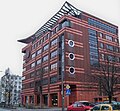Mokotów
Mokotów | |
|---|---|
 Wołoska Street | |
 Location of Mokotów within Warsaw | |
 Neighbourhoods of Mokotów | |
| Coordinates: 52°12′0″N 21°1′1″E / 52.20000°N 21.01694°E | |
| Country | |
| Voivodeship | Masovian |
| County/City | Warsaw |
| Notable landmarks | National Library of Poland, Polish Radio and Television, Pole Mokotowskie, School of Economics, Warsaw University of Life Science, Mokotów Prison |
| Government | |
| • Mayor | Rafał Miastowski [2] |
| Area | |
| • Total | 35.42 km2 (13.68 sq mi) |
| Population (2019) | |
| • Total | 217,683[1] |
| Time zone | UTC+1 (CET) |
| • Summer (DST) | UTC+2 (CEST) |
| Area code | +48 22 |
| Website | https://mokotow.um.warszawa.pl/ |
Mokotów (Polish pronunciation: [mɔˈkɔtuf] ) is a city quarter of Warsaw, the capital of Poland. It is densely populated, and hosts many companies and foreign embassies. Only a small part of the district is lightly industrialised (Służewiec Przemysłowy), while the majority is full of parks and green areas (Mokotów Field).
Although the area has been populated at least since the early Middle Ages, Mokotów was not incorporated into Warsaw until 1916. The origins of the area's name are unclear, first appearing as the village of Mokotowo in documents from the year 1367. It is hypothesised to have come from the name of a German owner of the village, who called himself Mokoto or Mokot, although no exact reference to such an individual has been found in historical records. Most of the area was urbanised and redeveloped throughout the 1930s in the style of modernism. The majority of buildings survived World War II, making it one of the few well-preserved pre-war areas of Warsaw. Mokotów Prison is located within the borough. Residential real estate in Mokotów, particularly in the neighbourhoods of Stary Mokotów and Wyględów, ranks among the most expensive in Warsaw.[3]
Subdivisions
[edit]Administrative units
[edit]The following lower-level administrative units (osiedle) are established within Mokotow (they do not cover the whole district).
Subdivisions
[edit]City Information System
[edit]Administratively defined in 1996, this district is divided into following areas:[4]
- Stary Mokotów
- Sielce
- Czerniaków
- Siekierki
- Augustówka
- Sadyba
- Stegny
- Wierzbno
- Ksawerów
- Służew
- Służewiec
- Wyględów
Historical
[edit]While the following subdivisions have no formal, administrative status, they are recognised in everyday life.
- Górny Mokotów (Upper Mokotow)
- Dolny Mokotów (Lower Mokotow)
Gallery
[edit]-
Red Villa on Sułkowskiego Street
-
Sielce Mansion on Cybulskiego Street
-
Warsaw Metro, Station Wierzbno
-
Sztuster Palace
-
Faculty of Management (University of Warsaw) on Szturmowa Street
-
Warsaw School of Economics building on Madalińskiego Street
-
Allotment plots on Augustówka and part of Czerniakowskie Lake
References
[edit]- ^ "Powierzchnia i ludność w przekroju terytorialnym w 2019 roku. Tabl. 21 Powierzchnia, ludność oraz lokaty według gmi". stat.gov.pl. Główny Urząd Statystyczny. Retrieved 2 September 2020.
- ^ "BIP Warszawa - oficjalny portal stolicy Polski".
- ^ "Mieszkania w Warszawie, które dzielnice są najdroższe a które najtańsze". 13 July 2019. Retrieved 31 May 2021.
- ^ "Mokotów-text - Zarząd Dróg Miejskich w Warszawie". Archived from the original on 2013-05-09. Retrieved 2013-09-14.
External links
[edit]- Official website

 Media related to Mokotów at Wikimedia Commons
Media related to Mokotów at Wikimedia Commons Mokotów travel guide from Wikivoyage
Mokotów travel guide from Wikivoyage
- Mokotów
- Populated places established in the 14th century
- Populated places established in 1951
- States and territories established in 1951
- 1990 disestablishments in Poland
- States and territories disestablished in 1990
- 2002 establishments in Poland
- Populated places established in 2002
- States and territories established in 2002










